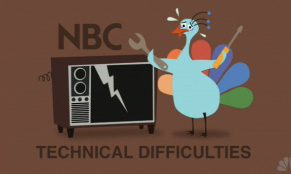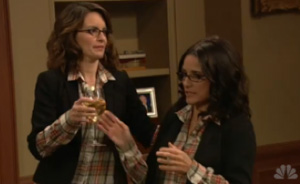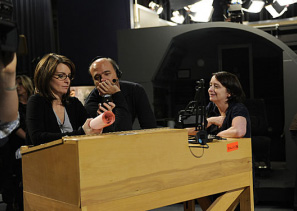Chai Boys, Nipples and “Breaking”: Meta-Humor on 30 Rock
 30 Rock‘s live telecast last Thursday opened with a medium shot of the TGS crew on stage setting up a FOX News skit. The camera then pulls back to reveal Jack Donaghy (Alec Baldwin) observing the scene on a TV while an announcer on set yells “10 minutes to air. Cast should be changing for the cold open.” Bright stage lights shine down on the set as Liz Lemon (Tina Fey) bursts into the office, and Donaghy asks “Does it seem weird in here to you? Everything looks like a Mexican soap opera!” Before responding, Liz pauses as she looks at the laughing and cheering audience. Thus, 30 Rock employs meta-humor from the outset of its live show, announcing a live cold open during the live cold open, commenting on the unusual video aesthetics of its stage performance, and literally nodding at the live studio audience.
30 Rock‘s live telecast last Thursday opened with a medium shot of the TGS crew on stage setting up a FOX News skit. The camera then pulls back to reveal Jack Donaghy (Alec Baldwin) observing the scene on a TV while an announcer on set yells “10 minutes to air. Cast should be changing for the cold open.” Bright stage lights shine down on the set as Liz Lemon (Tina Fey) bursts into the office, and Donaghy asks “Does it seem weird in here to you? Everything looks like a Mexican soap opera!” Before responding, Liz pauses as she looks at the laughing and cheering audience. Thus, 30 Rock employs meta-humor from the outset of its live show, announcing a live cold open during the live cold open, commenting on the unusual video aesthetics of its stage performance, and literally nodding at the live studio audience.
Self-referentiality is a staple of 30 Rock‘s satire. Yet, I almost needed a “drop” and a spinning top to resurface from this live episode’s multi-layered meta-humor. The levels of satire unique to this live episode are not neutral self-referential gags. This play with 30 Rock‘s bounded structure is predicated, mainly, on gendered and racial dimensions. The show’s season-high level of viewers implicates the material cultural significance of 30 Rock‘s live episode.
 30 Rock is certainly not the first scripted prime-time show to employ the “live-show” stunt (remember those live episodes of ER and Will & Grace?). However, critics have suggested that 30 Rock is comparatively a more appropriate show for a live episode. This notes Tina Fey’s background as a former SNL headwriter and 30 Rock‘s show-within-a-show premise and visual organization, although I would argue that 30 Rock constructs a skit comedy structure by editing in tangential scenes, a tactic made possible by the very fact that it is not a live show. Nevertheless, 30 Rock‘s integral relationship with live skit comedy cannot be overlooked.
30 Rock is certainly not the first scripted prime-time show to employ the “live-show” stunt (remember those live episodes of ER and Will & Grace?). However, critics have suggested that 30 Rock is comparatively a more appropriate show for a live episode. This notes Tina Fey’s background as a former SNL headwriter and 30 Rock‘s show-within-a-show premise and visual organization, although I would argue that 30 Rock constructs a skit comedy structure by editing in tangential scenes, a tactic made possible by the very fact that it is not a live show. Nevertheless, 30 Rock‘s integral relationship with live skit comedy cannot be overlooked.
The idea for this live episode originated during the 2007 Writer’s Guild Strike while the cast of 30 Rock performed live shows at the Upright Citizen’s Brigade theater. Two and a half years later, NBC announced on July 30th, 2010 that the upcoming fifth season would include a live episode, with a telecast of two versions: one for the East Coast and one for the West Coast. 30 Rock is usually shot on film, with one camera on a stage in Long Island City, Queens; however, sets and equipment were transported to 30 Rock‘s titular address at NBC Studios and the episode was filmed in typical live 3-camera set-up at SNL‘s home, Studio 8H.
Both real-time telecasts last Thursday employed several of 30 Rock‘s reoccurring themes to point to the show’s liveness. The live episode disciplines Liz’s errant femininity as it uses Julia Louis Dreyfus as a “hot-Liz-double” in tangential scenes Fey was unable to get to, and then references this as Jack tells Liz she looks better in her memory. Dreyfus’s performance of Liz employs racialized jokes about Jack’s male Indian-American secretary as she calls him a “Chai-boy” for the East Coast and “Aladdin” for the West. These performances are funny precisely because they point to the show’s liveness, and Dreyfus’s almost unreal and absurd exaggeration of Liz’s (racist) character.
 30 Rock‘s altered live structure edits the diegetic FOX News skits and fake commercials into the show’s visual narrative, which showcases Tracy Jordan’s hyperbolic blackness through his “break” from a performance of Obama. This is visually emphasized as each version has a different FOX News caption under Tracy’s Obama that points both to the blackness of Obama Tracy and the liveness of the episode. The diegetic commercials undermine hegemonic masculinity through centralizing erectile dysfunction in Dr. Spacemen’s ad and the mutilation of ideal masculinity in Jon Hamm’s ad. The content of each commercial changes in 30 Rock‘ s two real-time episodes and colludes with “Technical Difficulty” interruptions to point to the liveness of the show, but the overall presentation of diminished manhood is the same. Jenna’s hyper-sexuality is racialized as she threatens to “slip-a-nip” live on TGS, clearly referencing both 30 Rock‘s liveness and Janet Jackson’s live Superbowl wardrobe malfunction.
30 Rock‘s altered live structure edits the diegetic FOX News skits and fake commercials into the show’s visual narrative, which showcases Tracy Jordan’s hyperbolic blackness through his “break” from a performance of Obama. This is visually emphasized as each version has a different FOX News caption under Tracy’s Obama that points both to the blackness of Obama Tracy and the liveness of the episode. The diegetic commercials undermine hegemonic masculinity through centralizing erectile dysfunction in Dr. Spacemen’s ad and the mutilation of ideal masculinity in Jon Hamm’s ad. The content of each commercial changes in 30 Rock‘ s two real-time episodes and colludes with “Technical Difficulty” interruptions to point to the liveness of the show, but the overall presentation of diminished manhood is the same. Jenna’s hyper-sexuality is racialized as she threatens to “slip-a-nip” live on TGS, clearly referencing both 30 Rock‘s liveness and Janet Jackson’s live Superbowl wardrobe malfunction.
 There are certainly other significant points to be made about 30 Rock‘s live episode, such as NBC’s entire web page of “Live Episode” paratexts (you can take the trivia game on past live television or guess the differences between East and West Coast versions here). However, the most poignant moment of this episode was the insider reference to Rachel Dratch’s long absence on 30 Rock as Liz tells Dratch’s cleaning lady character Edwiga, “Haven’t seen you in a while.” This not only nods to Dratch’s 12 cameos in season one, but to her initial role on the pilot as Jenna DeCarlo – a character loosely based upon her history and friendship with Fey at Chicago’s Second City and SNL. The role was later changed to Jenna Maroney and cast with Jane Krakowski, suggesting that Dratch was replaced in favor of a more sexually appealing (less Jewish looking) actress. This contrasts with Dreyfus’s appropriate and even hot Jewishness, which ultimately points to the limits of subversive satire amid 30 Rock‘s ambivalent hyperbolic racism and sexism.
There are certainly other significant points to be made about 30 Rock‘s live episode, such as NBC’s entire web page of “Live Episode” paratexts (you can take the trivia game on past live television or guess the differences between East and West Coast versions here). However, the most poignant moment of this episode was the insider reference to Rachel Dratch’s long absence on 30 Rock as Liz tells Dratch’s cleaning lady character Edwiga, “Haven’t seen you in a while.” This not only nods to Dratch’s 12 cameos in season one, but to her initial role on the pilot as Jenna DeCarlo – a character loosely based upon her history and friendship with Fey at Chicago’s Second City and SNL. The role was later changed to Jenna Maroney and cast with Jane Krakowski, suggesting that Dratch was replaced in favor of a more sexually appealing (less Jewish looking) actress. This contrasts with Dreyfus’s appropriate and even hot Jewishness, which ultimately points to the limits of subversive satire amid 30 Rock‘s ambivalent hyperbolic racism and sexism.



Thanks for this astute discussion of the live episode, and in particular for pointing to the many, often fascinating layers to 30 Rock’s deployment of race and ethnicity in its overall representational politics. I wonder what your thoughts are on how audiences actually may view these dynamics; do you think many or most are aware of all of these complicated references, and how might their reception play in?
I have not done any audience studies, but I read several reviews of the live episode and mainstream critics do not acknowledge the racialized aspects of the live satire. I have many family members who love 30 Rock, and do not think it is political. This may be a reaction to the absurdity of its humor. A lot has been said in studies of satire about the function of hyperbolic racism in mocking bigotry, however, shows like 30 Rock are successful because they are intentionally polysemic and open themselves up to multiple readings. Its my observation that the formal elements privileges the perspective of Jack (Alec Baldwin), and encourages the audience to laughs along with him at Liz’s ugliness or Tracy’s juvenile blackness.